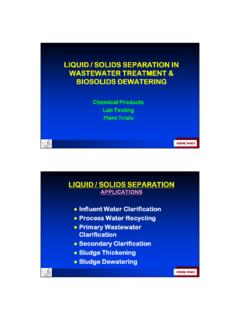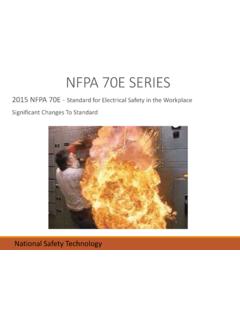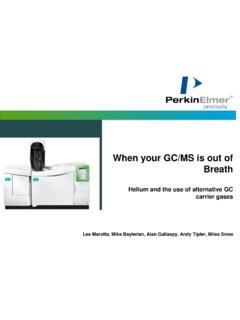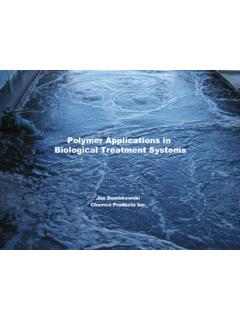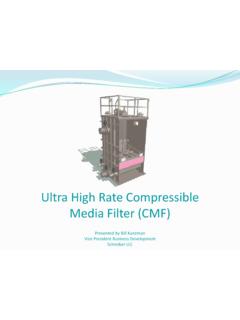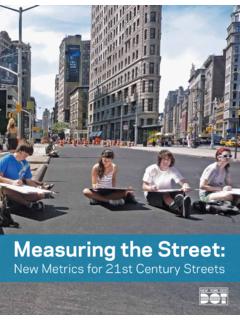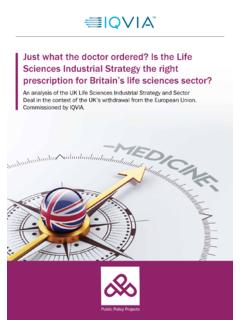Transcription of MDEQ Update Focus on Sustainability - mi-wea.org
1 MDEQ Update Focus on Sustainability Detroit River Lighthouse, photo courtesy of the Friends of the Detroit River MWEA October 18, 2018. Water Resources Division, MDEQ. Water Resources Protect and Monitor 4 Great Lakes 3,288 miles of Great Lakes shoreline 11,000 inland lakes 36,000 river miles million acres of wetlands 70,000 acres of critical dunes For swimming, fishing, drinking water and aquatic ecosystems. Issues Involving System Sustainability Stormwater Utility legislation Asset Management Program Collection system permit Resiliency (Climate). green Infrastructure Water Resource Recovery Facility (WRRF) utility of the future 21st Century Infrastructure Report Completed December 2016. For several sectors (water, transportation, communication, transportation); calls for coordinated asset management; pilots completed in SE MI and Grand Rapids area Stormwater Utility, system resiliency, green infrastructure, most effective and cost-effective use of infrastructure Wastewater Asset Management Plans A program for maintaining a desired level of service for what you want the assets to provide at the lowest life- cycle cost.
2 Lowest life-cycle cost refers to the best appropriate cost for rehabilitating, repairing, or replacing an asset. In a wastewater system, an "asset" is a component of a facility with an independent physical and functional identity and age ( , pump, motor, clarifier, etc.). Wastewater Asset Management Plans Five Core Questions of Asset Management 1. What is the current state of my assets? 2. What is my required "sustainable" level of service? 3. Which assets are critical to sustained performance? 4. What are my minimum life-cycle costs? 5. What is my best long-term funding strategy? Wastewater Asset Management Plans Adding conditions to major WWTP NPDES. permits since 2013. Starting this year to add to minor permits over MGD. Will add requirements to the new collection system general permit Where is the General Permit Internal/External stakeholder group started this June 2017.
3 Delayed over the last 6 months First draft of the permit should be sent out soon DEQ's intention is to get this general permit issued in Fiscal Year 2019. MWEA members have been important members and have developed portions of the draft permit Why do we need the General Permit Deal with any issues in collection systems under Part 41;. Reactive instead of proactive. SSOs in ACOs There are high wet weather flows at some Regional WWTPs. Flows have not been adequately reduced over time Collections systems must be maintained A sanitary sewer system is part of the POTW, and we believe can be regulated as such There are roughly 400-500 collection systems in the state that are not covered by NPDES permits CMOM (Capacity Management Operation &. Maintenance). Capacity Evaluation (testing, inspection, flow monitoring).
4 Management (org structure, training, customer service, legal authority). Operation (budget, emergency response, mapping, construction). Maintenance (budget, maintenance, cleaning schedules, parts and equipment inventory). Rehabilitation (SSO elimination, I/I reduction). Collection System General Permit Working to address issues Proper Operations Asset management (AM). Outlet and internal capacity restrictions (CMOM), address flows to meet excessive I/I definition or another acceptable regional criteria Inspection program SSO prohibition fiscal Sustainability incentives to participate Benefits of Coverage Potentially address SSOs under a NPDES. permit and not an order (ACO). Address high flows at some regional WWTPs by reducing flows at contributing collection systems Ensure important asset management programs, elimination of capacity restrictions, flexible but critical inspection frequencies, fiscal Sustainability Provide for some incentives (still need to be reviewed by the DAG).
5 Resiliency (Climate). Looked at all WRD wet weather programs (CSO, SSO, Storm water, Non-point source, CAFO, resource permitting). Had used Bulletin 71, TP 40, and NOAA. Now will be using NOAA Atlas 14, that includes recent storm data Will be messaged to regulated community over the next year green Infrastructure (GI) in Detroit WWTP. Permit Fits within the opportunities provided in the Detroit Future City report Areas of green Infrastructure Upper Rouge Area Near Eastside Area Develop a required level of stormwater control for new and redevelopment by 4/1/19. GI - Upper Rouge Area (implementation). Requires spending $50. million over 20 years Spending consistent with GI Plan, once approved Targeted reduction of stormwater of MG. by 2017. Detroit Future City Report GI - Near Eastside (planning).
6 Removes gray CSO. projects from previous permit Allows for planning of GI. potential in an area that has a relatively high amount of vacant land Requires a revised CSO. correction plan Detroit Future City Report MDEQ WRRF Initiative Michigan Governor's Recycling Council 2012 DEQ to develop plan to increase recycling 2014 Statewide plan to increase MSW recycling WRD WRRF Initiative 2015 WRD management recognized similar goals could be applied to wastewater facilities Recognize what WW facilities already doing; AND. further promote use of valuable resources Utility of the Future WWTP WRRF. Treat water to protect Treat water to protect public health and the public health and the environment environment Recover nutrients Optimize energy efficiency Produce energy Recover heat Water reuse green infrastructure MDEQ-WRD/MWEA Collaboration MDEQ-WRD and MWEA workgroup formed MWEA proposal Establish metrics & baselines Literature review Michigan WRRF Recycling Summit Recognition Program Outreach Program MDEQ-WRD Grant awarded MDEQ WRRF Initiative Updates Working closely with MWEA on their grant (through 2018), to be extended Working to facilitate Nitrogen and Phosphorus harvesting, biosolids reuse, and energy reduction WRD will discuss how to help educate permittee's on the WRRF process in 1.
7 Permits 2. DEQ website, conferences WRD will participate in Leaders Innovation Forum Technology (LIFT). MDEQ WRRF Initiative Updates Part 41 related efforts might include: Developing checklists for design/build Review WRD Innovative Technology Review memo to consider LIFT. Developing a Part 41 permit condition for Ancillary projects, to the primary function of treatment Developing checklist for BNR and anaerobic digestion Case Study - Marquette MI. Marquette MI. Wastewater Plant was constructed in 1954 and upgraded in 1979 and 2008. Design Flow = MGD, Avg Daily Flow = MGD. Activated Sludge Plant with Anaerobic Digesters. Biogas is used to heat the Plant and Digesters, excess is flared off. The City entered into a contract with Johnson Controls for a City Wide Energy savings project in 2017.
8 From that project the City is going to install 2, 100 KW. Kraft Cogen units. Startup in the fall of 2018. Other WWTPs that are addressing Utility of the Future Issues 1. GLWA WRRF (aka Detroit WWTP). Biosolids drying facility 2. Grand Rapids WRRF. Working to address sequestering of nutrients and also digestion for energy production Summary AtDEQ-WRD we are working in many programs to help with Sustainability Just starting to better understand and help regarding WRRF. Questions Discussion Contact: Phil Argiroff, 517-290-3039. Charlie Hill, 906-228-4527.
